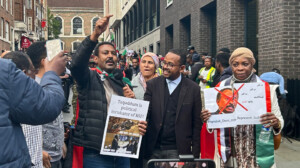Fuel and commodity shortage a national crisis in Sudan
The shortage of fuel has become a national crisis that has crippled movement in several cities in Sudan. Demonstrators blocked major roads and bridges in Khartoum in a protest against the bread and fuel crisis.
 Sudanese queuing to buy bread (File photo RD)
Sudanese queuing to buy bread (File photo RD)
The shortage of fuel has become a national crisis that is crippling movement in several Sudanese cities. Demonstrators blocked major roads and bridges in Khartoum in a protest against the bread and fuel crisis.
Many petrol stations have closed due to fuel shortage while hundreds of vehicles lining up in operating petrol stations. Government officials attributed the crisis to the disruption of the oil pipeline starting from the source fields in Kordofan to the Khartoum refinery. They also explained that periodic maintenance of the refinery contributed to the crisis and that the reserves ran out.
In a press conference on Monday, the Minister of Energy allocated four gallons for each vehicle for two days for fair distribution among the people and to ensure continuous supply until the crisis ends. The minister appealed to the Sudanese people to cooperate with the ministry to implement the program (four gallons). He also urged the Resistance Committees to cooperate with the authority to put an end to the practice of smuggling fuel.
At the same time, angry protesters on Monday blocked a number of main roads and bridges in Khartoum in protest against the bread and fuel crisis. They blocked El Sitin Street, Mansheya Bridge, and El Aylafoun Street. They also burnt tires and chanted slogans demanding swift solution of crises. In North Kordofan, protesters also blocked the highway between Khartoum and Darfur (Western Ingas Road) at El Khuwei. In Port Sudan, public transportation tariff was doubled as a result of the fuel shortage. However, the local authorities in Port Sudan responded by providing a 50 per cent discount for students.
In Khartoum, the Security and Defence Council on Monday held a meeting at the General Command of the Armed Forces. The spokesperson for the armed forces explained that the meeting discussed necessary measures to address the ongoing economic crisis putting in place necessary remedies to reduce the cost of living for basic needs. He said the Security and Defence Council asked the Finance Minister Ibrahim El Badawi to hold a press conference to clarify the facts regarding the measures that have been taken to tackle the economic crisis.
Radio Dabanga’s editorial independence means that we can continue to provide factual updates about political developments to Sudanese and international actors, educate people about how to avoid outbreaks of infectious diseases, and provide a window to the world for those in all corners of Sudan. Support Radio Dabanga for as little as €2.50, the equivalent of a cup of coffee.












 and then
and then